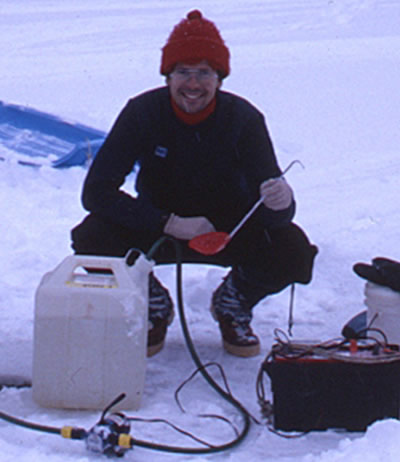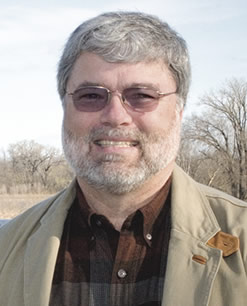It affects wallets, the environment, nutrition and the health of people — especially the developing fetus.
Mercury pollution is a serious problem for Wisconsin, the Upper Midwest and the Nation.
That’s why UW-La Crosse scientists have been studying it in lakes and rivers of the Upper Midwest for decades, contributing to the weight of evidence that shows what a serious problem the most toxic form of mercury — methylmercury — is for fish, wildlife and humans.
An article published in one of the world’s leading environmental science journals “Environmental Toxicology and Chemistry,” by UW-L Microbiology Professor Mike Winfrey and his Canadian coauthor John Rudd, demonstrates UW-L’s substantial contribution to mercury research. The article, which reviewed years of mercury research as well as new findings, was recently ranked No. 24 on the Top 100 list of the most highly cited environmental impact papers in the journal’s 30-year history.

Mercury research started at UW-L in the 1980s. UW-L Microbiology Professor Mike Winfrey is pictured here conducting research during the early years.
Written in 1990, the article has been heavily cited for more than two decades. Winfrey notes what likely makes the paper popular is the cause and effect relation it demonstrates between acid lakes and high levels of mercury in fish. Especially in the 1980s, people wanted to know about the effect of acid rain and lake acidification on the environment. The article explored how mercury transformed into a more toxic form — methylmercury — as a body of water became more acidic.
“When you have something in the environment that is toxic and there is a lot of concern about it, people are going to research and write a lot about it,” Winfrey explains. “It’s nice to know people appreciate the research you did.”
A history of mercury research at UW-L
The article Winfrey co-authored, “Environmental factors affecting the formation of methylmercury in low pH lakes” is just one of many mercury studies published by UW-L faculty and students since the mid 1980s. Over the years, a number of UW-L faculty and students have become internationally renowned for their research on mercury.
They’ve led conferences, spoken on advisory panels, published scientific papers and ultimately influenced policy and management actions taken to reduce mercury emissions and to communicate the health risks and benefits of fish consumption.

Jim Wiener, Wisconsin Distinguished Professor, River Studies Center, is a long-term participant in mercury research at UW-L.
Mercury research started at UW-L in the 1980s when Winfrey, Ron Rada, a retired Biology professor, and then adjunct professor Jim Wiener studied mercury in the Wisconsin River. Although the geographic extent of mercury pollution was not known at that time, with increasing knowledge of the problem, today mercury is frequently cited in news headlines and health advisories. In the United States, mercury is the primary cause of fish-consumption advisories, accounting for 81 percent of all advisories in effect during 2010.
Some members of the human population, including pregnant women and children, are particularly vulnerable if they eat large quantities of mercury-contaminated fish. Pregnant women risk impacting the neurological development of their fetuses because of mercury’s effect on the developing brain and intelligence.
As the mercury toxicity problem has become more well known, UW-L mercury research has expanded from nearby rivers to bodies of water from coast to coast and has involved collaborations with experts internationally.
Mercury has been found to have not only an adverse impact on a nutritional resource, but also the economy, explains Wiener.
“People come to this region to fish and then learn, ‘by the way, you should limit the consumption of fish that you catch,’” he says.
Mercury was initially thought of as a problem caused mainly by wastewater effluents from industry, but it was later found that mercury emitted to the atmosphere, the kind that can trickle down to the most remote waters, is the primary cause of mercury contamination in areas without industry. UW-L’s current mercury research project since 2008 investigates mercury contamination in the National Parks of the Great Lakes Region with funding from the U.S. Environmental Protection Agency and National Park Service. Primary researchers include: UW-L Biology Professor Mark Sandheinrich, Chemistry Professor Kristofer Rolfhus, Biology Professor Roger Haro and Wiener.
The interdisciplinary team contributes to the strength of UW-L’s research, notes Wiener. But, he adds, it wouldn’t be possible without students. For example, nearly 50 UW-L students have been involved in the Great Lakes parks project. While students learn valuable research skills, their contributions in the field and laboratory keep mercury research moving forward.
“A lot of work in the lab and field is done by students,” says Wiener. “The students are really the foundation of what we’ve been able to achieve at this campus.”
And when their UW-L student research is done, many have found other ways to continue to mitigate the mercury problem. Rolfhus was a former UW-L student who returned to his alma mater a few years after completing his doctoral degree in oceanography. Today he is internationally renowned for his research on environmental chemistry of mercury and on the bioaccumulation and transfer of methylmercury in the lower levels of aquatic food webs.
UW-L’s commitment to excellence in undergraduate research was recently recognized among an elite group of 39 universities nationally that provide excellence in undergraduate research in U.S. News & World Report’s 2014 America’s Best Colleges list.
UW-L alum Chad Hammerschmidt performed mercury research as an undergrad and graduate student at UW-L and is now an associate professor of Earth & Environmental Sciences at Wright State University in Ohio. His recent studies examine the biogeochemistry of mercury and methylmercury in arctic and temperate watersheds, marine systems (coastal and open ocean) and the atmosphere.
“One of my greatest rewards has been to transfer some of the expertise and knowledge that I brought to the professorship to others,” says Wiener. “It’s a great feeling to know that we have extraordinary people out there who will be working on this problem for the next few decades.”
A UW-L mercury research who’s who
Roger Haro, professor of biology: Haro joined the mercury team in 2003 and is becoming nationally recognized for his research on the accumulation of methylmercury in bottom-dwelling, freshwater invertebrates and the use of larval dragonflies as biological indicators of mercury contamination in freshwater systems.
Ronald Rada, retired professor of biology: An early contributor to UW-L mercury research, Ron investigated mercury contamination of bottom sediments in lakes and rivers in relation to human sources of the metal.
Kristofer Rolfhus, professor of chemistry: A former undergraduate student who returned to campus after earning his doctoral degree in oceanography, Rolfhus is internationally renowned for his research on the environmental chemistry of mercury and on the accumulation and transfer of methylmercury in the lower levels of aquatic food webs.
Mark Sandheinrich, professor of biology: An aquatic toxicologist who is internationally renowned as an authority on the effects of methylmercury on the health and reproduction of freshwater fish.
Robin Tyser, professor of biology: The most recent addition to the UW-L mercury team, Rob is leading a study of methylmercury exposure in developing embryos of songbirds in Voyageurs Nation Park in north-central Minnesota.
Jim Wiener, Wisconsin Distinguished Professor, River Studies Center: A long-term participant in mercury research. Wiener was an adjunct faculty member active in mercury research projects from 1980 to 2000 while employed as a fishery research biologist with the U.S. Department of Interior. Wiener joined the River Studies Center as a Wisconsin Distinguished Professor in January 2001. He is an internationally recognized authority on the bioaccumulation and ecotoxicology of mercury in aquatic ecosystems.
Michael Winfrey, professor of microbiology: An early contributor to UW-L mercury research, Winfrey investigated microbial transformations of mercury in lakes and rivers, particularly the microbial conversion of inorganic mercury to methylmercury.
